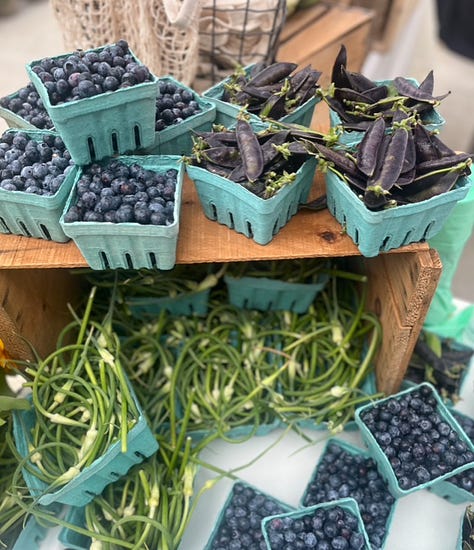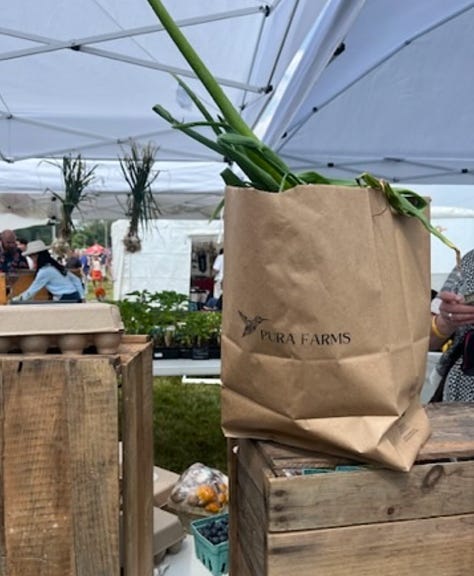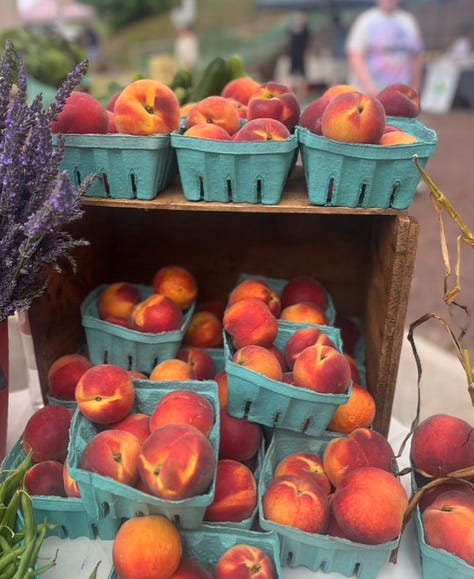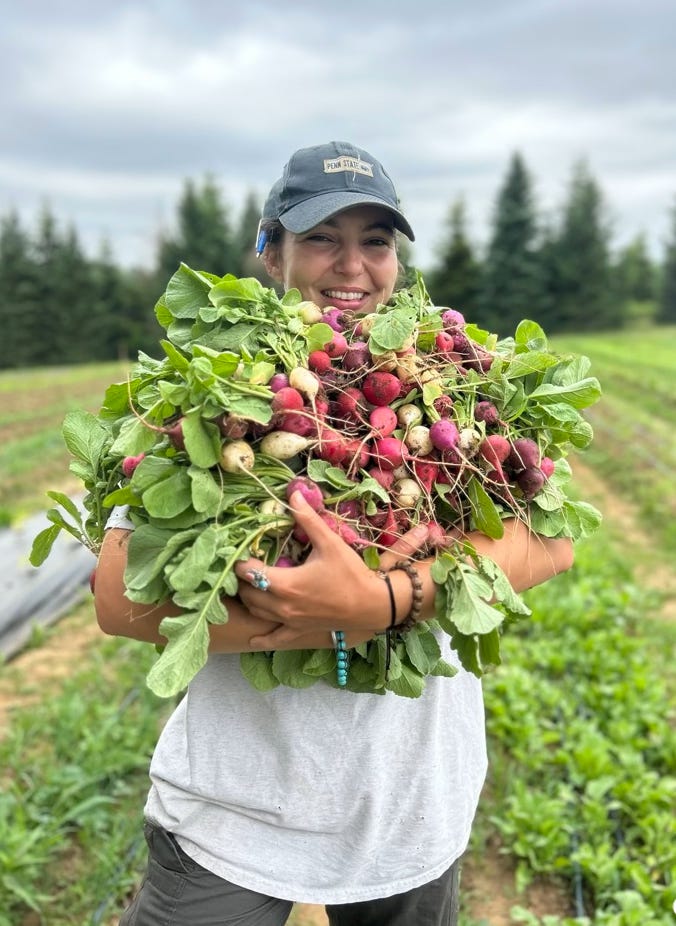Oh the love/hate relationships of farmers markets. I launched Pura Farms in early spring of 2023 and in my first season I was selling both (i) direct-to-consumer at a weekly Sunday farmers market and (ii) wholesale to restaurants with deliveries 3x/week. Before the market season even ended, I found myself backing out and giving up my space in early September. I still had weeks left of selling to do, but something had to give. To my fellow farmers, new or experienced - hopefully this gives you some guidance on the best sales channels depending on your product offering and labor support. & encourages you to listen to your body. And to my loyal market community who I miss so much, if you’re wondering what happened and where we went… read on!
The reason why we left the farmers market last year is one thing, but why we’ll continue to stay out of them (for now) is a whole other strategy in itself. I’ll get into both.
Farmers & paid subscribers, keep an eye out for part 2 later this week where I’ll share my experience with buyers’ preferences for produce type and size as well as packaging, price, order quantities and expenses for farmers markets vs. restaurants.
So why did we leave farmers markets in the first place?
Farming seasonal annual crops allows for a fresh start each year. We use the off-season months to make tons of tweaks and improvements to the business. HOWEVER, it’s a bad habit to wait until the off season to cut ties with any areas of the business that are poorly impacting operations. No other business model would “wait” for a specific season to rid themselves of dead weight, and farming should be no different. So, I left the market mid-season.
It was a hard decision, and one I went back and forth on for WEEKS, but ultimately the burn out got to me. Leaving the farmers market was in alignment with our long-term vision, which I’ll get into, but also for my own physical and emotional well being. Markets are EXHAUSTING, especially without the proper labor, and I was a mighty team of *one* constantly soliciting help from sleepy family members in the early hours of their “relaxing” Sunday. There was also the fact that I failed to properly plant a fall crop in the midst of summer chaos and so I was quickly running out of produce to sell.
I’ve witnessed people get into farming only to burn out completely a few years later, or find themselves in poor health, poor relations with friends and family, or in poor business standings. Chris Newman of Blackbird Coop talks a LOT about this, so I was well aware of this trend that is taking my peers out left and right. Yes, I made a commitment to the market, and yes, I had community members depending on me for produce. But, I also recognized that the business wouldn’t exist in the future at ALL if I let it crash and burn by overextending myself that first season. Ya live & ya learn…
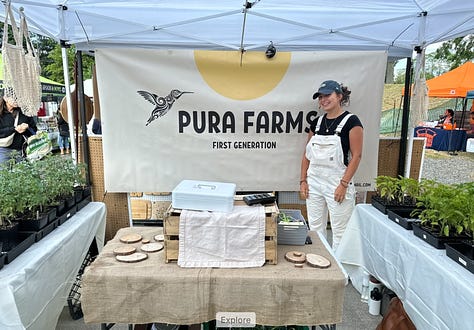
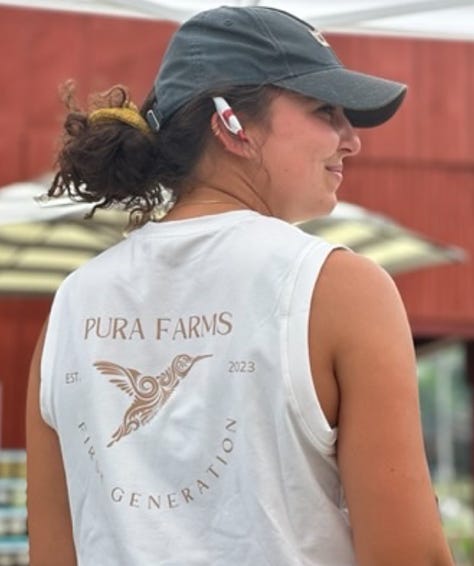
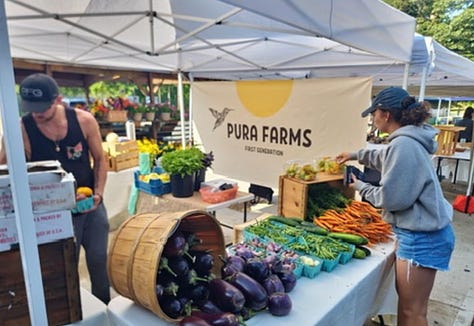
What I’d Do Differently
-
Take better care of myself so I can take better care of the business. This ultimately comes down to nourishing myself with good food and hydration. I always failed to pack food and enough water which really gets to you on top of setting up and breaking down a market stand, and selling in the burning heat of summer. In the future I’d be sure to pack food the night before - breakfast, mid-market snacks & a post market meal for the ride back to the farm for unloading. Oh, and lots of water. I’d be in a way better position to focus and have the energy needed to interact with my community.
-
Start market prep days in advance. I learned this on the back end of market season, but preparing as much as I can multiple days in advance and not the day before makes a world of a difference in my stress levels and just overall ability to get everything done on time. I’m talking about writing price tags & produce labels, washing tablecloths, charging credit card readers, cleaning tables, packing produce in pint and quart boxes, getting cash for change and taking inventory.
-
Hire help! Constantly bugging my family felt heavy at times. I simply could not do it alone & felt it weighing on my body but also on my mind for making this endeavor somehow everyone else's responsibility. Businesses need employees. I’m still learning this.
-
Commit to very few market days/wholesale clients. Start off a bit slower & add days as it feels right. I thought market once/week was a good pace but as a solo farmer and first time business owner, I would prefer every 3-4 weeks and once I felt really comfortable and prepared, I would increase my commitment. This is easier said than done because not all markets are flexible with adjusting market days/weeks but you can start slow in season one and ramp up in season 2.
Why our business strategy doesn’t involve returning to market any time soon
Pause for a quick story time - I used to work in restaurant kitchens, that’s how I got into all of this… spending endless hours cleaning, chopping, and preparing fresh produce we’d receive multiple times/week - typically from California and at a steep price. Quality was on a super inconsistent spectrum of very shitty to astoundingly pristine - either way, it was all over the place and coming from way too far away. Anyone who’s worked in hospitality knows what I’m talking about. Let's just say some purveyors don’t pride themselves on freshness nor locality of produce… so I decided to do it myself. Call me crazy? Yes, yes I am.
With that being said, food is my first love. And so is the restaurant industry. So I started this business with that focus in mind - to meet the needs of Chefs and provide some kickass quality produce from a few streets or towns away, not a flight. But, when the farmers markets started to take up more of my energy than I planned for, I found myself putting my restaurant clientele and business goals on the back burner. Not ideal.
These challenges are unique to the size of my operation, which is only about ¾ of an acre. If you have a larger plot and crew size you are likely able to do it all - markets and wholesale. For me, markets we’re WAY too distracting. There were many weeks where I found myself with a limited harvest for specific vegetables, and so my weekly thought process went something like this:
Do I bring this to market or do I offer this to my Chefs this week? If I brought it to market and it didn’t sell, I’d kick myself for the missed opportunity to restaurants. But if I wait for my Chefs to place their orders then I can’t take this to market in case they want it. Well maybe if I sell it to my Chefs and at markets… no wait, will I even have enough to sustain the length of time they plan to run the dish? Can I meet their volume? But I don’t want to show up to market empty handed, feeling embarrassed of my small volume offerings compared to my abundant vendor the next stall over…so maybe I’ll bring all of my tomatoes for the day.
And yes, I sold out of tomatoes… but only to not have enough to fulfill wholesale orders that week. I was constantly fighting for farmers market customers, because they’ll return if you’re consistent in your offering, but at the risk of sacrificing my restaurant relationships. So you see how chaotic a lack of focus can be?
Trying to juggle two entirely different demands can be extremely distracting if it is not balanced properly. I found myself providing what felt like half-assed offerings to both customer groups, yet I was working harder than ever. My intentions weren’t focused enough. Diminishing returns type of thing. And so I realized I’d rather put all of my energy into one market group (wholesaling) and do it really well, rather than sacrificing the quality of my services and brand reputation trying to meet everyone’s needs.

Stay Focused & Learn to Say “No”
My advice is to choose one outlet for your first few years. Stay focused. And get really good at saying no. Saying “no” to new market opportunities, partnerships, one-off orders. Don’t let yourself get distracted. You can always add on more opportunities when your operations are well-oiled and prepared for it. You’ll deliver better results rather than overcommitting, dropping the ball, and setting a bad impression that’s difficult to reverse. Massage those relationships, keep the door open, but protect the long-term health of yourself and your business with a simple “not right now”.
If you’re planning to do farmers markets, keep your focus there. Wholesale? Stay in that lane. Or if you decide to mix the two like I did, start slow with a biweekly or monthly market and only commit to 1-2 wholesale customers. Don’t overdo it!!!!!
One thing I will say, selling direct to consumers at the farmers market was the easiest way for me to bring in revenue and have some liquid cash on hand to continue production in those early months. Restaurants take longer to fulfill invoice payments and are much more challenging clients to secure than farmers market shoppers. BUT, it’s easy to think you’re making a profit at market when you’re collecting hard cash in the moment without taking into consideration all of the costs for the day: labor spent picking/washing/packing, booth supplies and marketing materials, vendor fees, transportation costs, labor costs to load/set up/sell/break down/unload, cost of unsold products... the list goes on. It just wasn’t worth it anymore.
With that being said, having a back up outlet for excess produce that isn’t sold through our main wholesale channel would be SO helpful because as most farms experience, we have a lot of food waste. My ideal situation would look like this: prioritizing wholesale customers and fulfilling their orders first, and then selling remaining produce direct-to-consumer at an honor system farm stand on site that requires minimal labor aside from stocking inventory. My current land lease doesn’t allow for on-site sales but maybe in the future.
Celebrating Little Wins
All of this to say, I’m super proud of myself for everything I accomplished that first year, I learned SO much. And I’m so grateful for every person who helped get me there and through it whether you donated to the startup fundraisers, showed up to market week after week, helped me harvest, wash, pack, set up or break down. Or most of all sent me love and words of encouragement. I wouldn’t have it any other way.
Part 2 coming this week!
In case you missed it above, I’ll be sending out part 2 later this week where I’ll share my personal experience with farmers markets vs restaurants - placing orders, setting prices, unexpected expenses, buyer preferences and more. A pros vs cons type of thing with comparisons and the inside scoop on both sales channels. Become a paid subscriber for access, see ya then!

